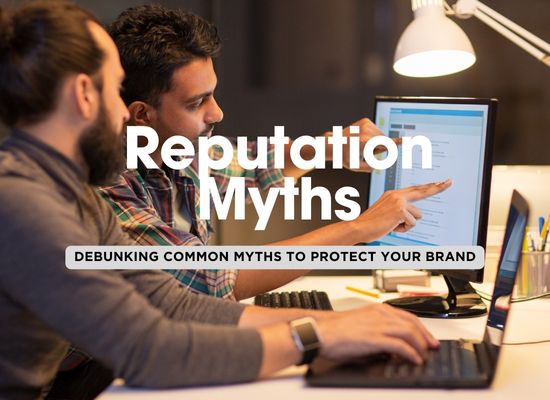Reputation management is crucial for building and maintaining a strong business presence, especially online. However, many misconceptions can lead companies astray, resulting in practices that damage rather than protect their reputation. From the idea that “bad reviews don’t matter” to thinking “no response is the best response,” these myths can have serious consequences. Here are six reputation management myths that, if followed, could harm your business—and the reality behind each.
1. Myth: Negative Reviews Don’t Matter 🚫
Reality: Negative reviews can significantly impact how potential customers perceive your business. Many consumers check reviews before making decisions, and a pattern of unaddressed negative feedback can turn them away. Ignoring bad reviews doesn’t make them go away—in fact, it can amplify their effects.
Why It’s Harmful: Ignoring negative reviews can create the impression that your business doesn’t care about customer feedback, damaging trust and credibility.
Action Step: Acknowledge and respond to negative reviews professionally. Address specific concerns and, if possible, offer a resolution to show your commitment to customer satisfaction.
2. Myth: No Response Is the Best Response 🤐
Reality: Staying silent on negative feedback or customer complaints can make your business appear indifferent or unresponsive. A lack of response can also give the impression that the feedback is valid and that your business has no defense or explanation.
Why It’s Harmful: Not responding can escalate negative sentiments, making it look like your business has something to hide or lacks accountability.
Action Step: Respond to reviews promptly, especially negative ones. A polite, professional response can show that you value customer feedback and are dedicated to improvement.
3. Myth: Only Focus on Positive Reviews 🌟
Reality: While positive reviews are great for building credibility, exclusively focusing on them can lead you to overlook important insights from negative feedback. Constructive criticism can be valuable for identifying areas of improvement and making your business more customer-friendly.
Why It’s Harmful: Ignoring negative feedback can create a biased picture, leaving issues unaddressed that may eventually impact customer satisfaction and loyalty.
Action Step: Regularly monitor both positive and negative feedback. Use constructive criticism as an opportunity to make improvements and demonstrate your commitment to customer care.
4. Myth: Reputation Management Is Only Needed After a Crisis 🛠️
Reality: Effective reputation management should be ongoing, not just reactive. Waiting until a crisis hits to address your online reputation can make it more challenging to rebuild trust and credibility quickly.
Why It’s Harmful: A reactive-only approach can leave your business vulnerable to unexpected reputation hits and unprepared for crisis management.
Action Step: Build a proactive reputation management strategy by consistently monitoring and engaging with customer feedback. Maintaining a positive reputation can serve as a buffer if a crisis does occur.
5. Myth: SEO Has Nothing to Do with Reputation Management 🔍
Reality: SEO and reputation management are closely linked. Positive or negative content about your business often ranks high in search engine results, affecting how people perceive your brand. Ignoring SEO can allow negative content to dominate search results, shaping your reputation unfavorably.
Why It’s Harmful: A lack of SEO strategy can lead to negative or irrelevant information showing up first when potential customers search for your business.
Action Step: Implement SEO best practices to ensure positive and accurate information ranks high in search results, pushing down any unwanted content.
6. Myth: Reputation Management Is Too Expensive for Small Businesses 💸
Reality: Many reputation management practices, like responding to reviews and creating quality content, are low-cost or free and can be done in-house. Even small steps can make a big difference in maintaining a positive brand image.
Why It’s Harmful: Avoiding reputation management due to cost concerns can result in missed opportunities to protect and enhance your brand’s credibility.
Action Step: Prioritize affordable reputation management activities, like monitoring reviews, responding promptly, and creating valuable content that builds trust with your audience.
Understanding and debunking these common myths can prevent costly mistakes and ensure a healthier, more resilient brand reputation. By staying proactive and addressing feedback head-on, your business can build trust, improve customer satisfaction, and establish a strong, positive presence. Remember, reputation management isn’t just damage control; it’s a long-term strategy for success.



